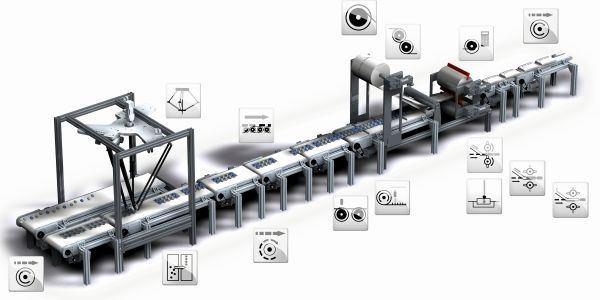How component manufacturers support their sales organisations in the systems business
“Made in Germany” is as valid today as ever as a sign of excellent quality. German component manufacturers have always been able to maintain a technological edge to defend their market position and justify premium prices. The international competition – in particular from the Far East – is, however, gaining ground technologically. The race is costing a great deal of energy: While the shorter innovation cycles result in spiralling costs, the competition in Asia benefits from the lower personnel and energy costs and puts pressure on prices.
One solution chosen by many European manufacturers is the systems business. Here, they rely on a strength that is difficult to copy, namely the solution expertise of their staff. Instead of simply selling components, they carefully analyse their customers’ processes and design appropriate solutions. Their own components are combined with those of other suppliers along with software and services to form systems. This type of system is more valuable to the customer than the sum of its individual parts, because it specifically addresses the customer‘s problem and is supplied fully-integrated from a single source. The task of integration is performed for the customer, who no longer requires the necessary expertise – a significant cost-saving factor. Customers also benefit more quickly from the innovations of their suppliers: New developments that do not affect the system’s interfaces can be easily integrated.
The selling of systems is a successful strategy. The VDMA/McKinsey study “The future of German mechanical engineering” indicates that solution providers show stronger growth than pure component manufacturers. The demand for system solutions is increasing and competitive pressure is lower. Another advantage is the stronger customer loyalty in the systems business compared to simply selling components.
Case studies: BOGE compressors and Lenze
Boge, a manufacturer of high-quality compressors and compressed air systems, realised this at an early stage. Several years ago the company built up its systems business in six strategic areas. Boge provides effective solutions for various industries, from simple blow air to completely dry, oil-free sterile compressed air for pharmaceuticals and food processing. Hardware components (such as the compressor, the air-processing equipment and the necessary transport and supply pipes) are combined with the appropriate control software and a service offering, tailored to the specific industry. The result is a highly-specialised solution for each customer. “The solutions in the strategic areas are highly valued by the users. The systems business generates strong customer relations with a high level of loyalty” reports Matthias Eichler, Head of Branding at Boge.
“The systems business generates strong customer relations with a high level of loyalty”
Lenze, a global specialist in drive and automation technology, also utilises its solution expertise to create added value for its customers, building on its over 65 years‘ experience in motion control. Together with the customer, the Lenze experts develop drive solutions that are perfectly tailored to the task of each individual machine. The company’s extensive application know-how is essential to this process. From the comprehensive product portfolio, the perfect combination of components is selected for the drive solution. Here, the thermal and mechanical load is taken into account, but also other aspects such as service life and energy consumption. This also applies to the entire power train and includes multi-axis systems.
With its special “Motion Centric Automation” service, Lenze goes one step further. As one of the few suppliers on the market, Lenze supports its customers throughout the entire development process for each machine, from the initial idea right up to after-sales service. From the optimisation of existing machines to the development of new ones. “We see ourselves as providers of solutions and have made it our goal to make engineering simpler for the customer. With our systems approach, we make the technology easier to master for mechanical engineers”, says Olaf Götz, Head of Engineering Tools at Lenze.

Thanks to this type of approach, the role of the component manufacturer is changing: pure suppliers are becoming partners who provide expert support at every stage of the product life cycle. This is particularly attractive for medium-sized mechanical and plant engineering companies.
How to make the solution business profitable
Any company that aims to provide comprehensive support for the customer and supply perfect individual solutions is faced with the same risk that mechanical and plant engineers know only too well: getting too wrapped up in special features and thus creating solutions that are too expensive. This explains why the systems business has up to now been less profitable on average than the component business, as shown in the aforementioned McKinsey study. To make a profit in the systems business there are two important prerequisites:
Step 1: The component kit is turned into a modular system
Step 2: The sales department is transformed into a systems sales organisation
Step 1: Turning the component kit into a modular system
The first step involves expanding the component kit. What is already usually standard for the physical components, now also applies for services and software. Companies‘ offerings are being standardised in such a way that you can configure them and combine them on a modular basis to create a system solution. Lenze has already taken this step. Realizing that software is just as important as hardware when creating a solution for a motion task, Lenze provides its customers with standardised software modules for the development of a machine control system. The software modules represent the basic functions of a machine, including, for example, modules for material supply, transportation, longitudinal and cross sealing, and cross-cutting. “By (re-) using already-tested models, it is possible to cut costs, reduce errors and save time all at once. The customer then has more time to concentrate on the essentials of their machine”, explains Olaf Götz.
Step 2: Transforming the sales department into a systems sales organisation
In the second step, the sales department is developed in such a way that it is able to use the modular system to create effective solutions. To do this, the sales organisation requires comprehensive know-how. The staff need to know the modular system thoroughly, and be able to use it to develop the desired customer solutions.
To maintain a consistently high standard of quality in a systems sales organisation, this knowledge has to be available in a configuration software.
A vital prerequisite for this is that the configuration software is suitable for system configuration. Unfortunately, this is where many conventional configuration solutions reveal their limitations. While it is sometimes still possible to support a pure component sales department with simple Excel sheets, an in-house development or an ERP-based configurator, a systems sales organisation requires a professional configuration solution. It is important that this solution allows the development of a system model that records the requirements of the overall system and, via parameters, reflects these in the configuration of the individual components. This ensures that the individual modules fit together and are designed to optimise the overall system.
One practical example is the configuration solution Drive Solution Designer (DSD) from Lenze. Using the DSD, the sales department and also the Lenze customers are able to design complete drive solutions. In DSD the drive solution is modelled as a complete system, so the configurator supports the whole drive dimensioning. This also applies, for example, for the energy consumption, and DSD is thus able to create an Energy Performance Certificate for the entire solution.
Lenze plans to make the models even more complete. Olaf Götz reports: “The DSD already provides indispensable support for the compilation of drive solutions from drive components. The next logical step will be to include the software from our component kit in the configuration solution”.
Lenze is thus in line with Boge: “Especially in the systems business, it is important for us to offer solutions from a modular system. Our configurator supports the sales department in doing so” explains Matthias Eichler. This is because the systems business requires a systems sales organisation. A company that equips its sales department with professional tools has the best opportunities not only for growth in the systems business but also of remaining profitable in this sector.

Strategic Marketing, encoway GmbH
LinkedIn





